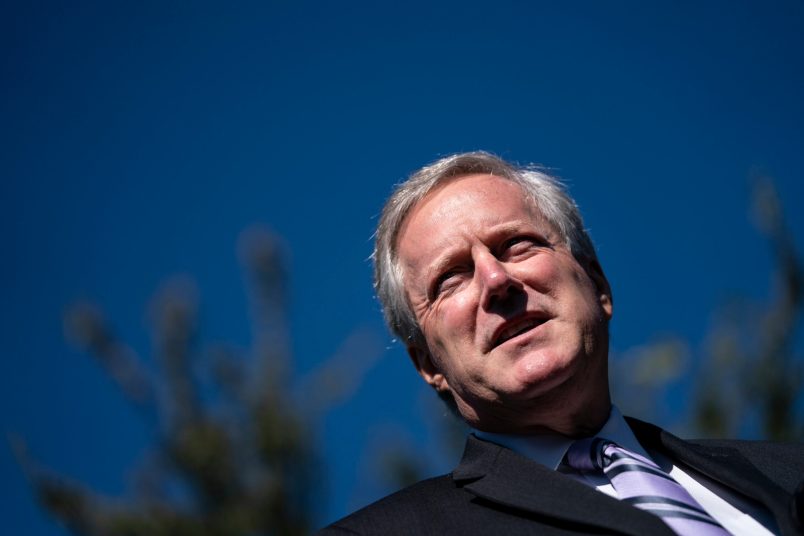Former White House chief of staff Mark Meadows sued the Jan. 6 Committee, its members, and Speaker of the House Nancy Pelosi (D-CA) on Wednesday.
Meadows named Pelosi, all the Jan. 6 Committee members, and the panel itself in the suit, filed in federal court in D.C. The lawsuit was first reported by Politico.
Meadows is suing to block the enforcement of a committee subpoena for his insurrection-related records and testimony, saying that it was “issued in whole or part without legal authority in violation of the Constitution and laws of the United States.” The former White House chief of staff also wants a judge to block his personal cell phone provider from complying with a panel subpoena.
In the lawsuit, Meadows said that Verizon told him that it would comply with the demand by Dec. 15, absent “a court document challenging the subpoena.”
Meadows argued in the case that even though President Biden had waived executive privilege over the documents, he found himself “in the untenable position of choosing between conflicting privilege claims;” one submitted by Biden, and the other by former President Trump.
Though former Presidents do not currently have the right to make broad assertions of executive privilege, Meadows invites the federal judiciary to create one.
“Mr. Meadows turns to the courts to say what the law is,” the lawsuit reads.
“Without intervention by this Court, Mr. Meadows faces the harm of both being illegally coerced into violating the Constitution and having a third party involuntarily violate Mr. Meadows rights and the requirements of relevant laws governing records of electronic communications,” the suit reads.
The arguments follow one by made by Trump himself in a separate case, filed to stop the National Archives from complying with a Jan. 6 subpoena: that he, as a former president, should be able to seal off federal records created during his time in office.
But Meadows takes it a step further: the panel with which he was, until Tuesday, ostensibly cooperating, is illegitimately constituted, he argued. Speaker Pelosi, he argued, did not follow her own rules in assembling the committee, including by appointing two Republican members who were not recommended by House Minority Leader Rep. Kevin McCarthy (R-CA).
The panel, therefore, “has no authority to conduct business because it is not a duly constituted
Select Committee.”
Meadows wrote an entire book about the subjects on which he claims to be barred from discussing. The rest of the lawsuit rehashes claims about the subpoena lacking a valid legislative purpose that Trump used in his battle to stop House panels from investigating him while in office.
This includes a remark that the panel’s authorizing resolution is “vague to the point of meaninglessness.” The resolution says that the committee exists to “investigate the facts, circumstances, and causes relating to the domestic terrorist attack on the Capitol.”
Unlike Trump’s suit to block the National Archives subpoena, Meadows is represented by a longtime conservative D.C. lawyer in this case: George Terwilliger III, a George H.W. Bush-era deputy attorney general who worked on Bush jr.’s team during the 2000 Florida recount.
Panel Chairman Rep. Bennie Thompson (D-MS) said hours before the lawsuit was filed that he would initiate criminal contempt proceedings against Meadows. The former Trump aide said this week that he would not comply with a panel subpoena for his records.
Meadows had already handed over some records to the committee, shedding more light on White House involvement in the planning of Jan. 6.
It’s a somewhat head-spinning move for the former member of Congress from North Carolina, and comes in the wake of the indictment of Steve Bannon for openly defying a committee subpoena.
In that case, Bannon had not worked for the administration for years, and made an executive privilege claim while largely ignoring the panel.
Meadows has at least corresponded with the panel, and served as Trump’s chief of staff for most of his final year in office.
The complaint is below:







He’s a dictator loving criminal and has no time for foolishness like rule of law. Apparently, Mark is proud of his scheme to subvert legal citizen voters, fair elections, and the legal system. Besides, no time for this. He has a dictator to please.
Must really be scared about what they might find.
hilarious.
HIS trial will probably happen before BANNON’s.
When you can’t dazzle them with brains, baffle them with bullshit.
“I am pissed my book’s details on Trump spreading COVID to veterans and others got leaked. I’m also need to protect myself from my Leader™️, who’s having a fit over the documents I gave to the Jan 6 commission showing his involvement. I hope this covered my butt with the Leader™️,” Meadows added with a grimace.